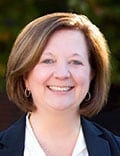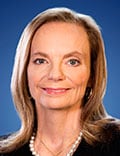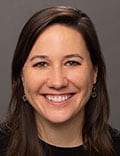Attempting to address increased demands on healthcare, rising turnover, and short staffing, among other issues facing America's nurses, a handful of nursing schools are among a growing list offering loan forgiveness programs to fill the nursing pipeline.

Lisa Kitko, PhD, RN, FAAN
Even before the pandemic, New York state's Department of Health predicted a shortage of more than 39,000 registered nurses by 2030. Since then, "hospitals statewide have reported difficulty recruiting and retaining nurses," said Lisa Kitko, PhD, RN, FAAN, dean of the University of Rochester School of Nursing, Rochester, New York. She and her colleagues realized they needed to be creative to tackle the crisis in their own community.
The result was the University of Rochester Nursing Scholars Program that covers tuition for students pursuing a yearlong accelerated bachelor's degree in nursing. The program will soon accept its first cohort for the fall 2023 semester, offering career-changers a chance to enter the nursing profession with a guaranteed job at one of two area hospitals upon graduation.
While the nursing shortage prompted the university's loan forgiveness program, Kitko said she saw benefits for both the community and the next generation of nurses.
Throughout the program, the school will match scholars with UR Medicine nurses who have expertise in the areas that most interest students. "Covering the costs of a nursing education may help bring students into the classroom, but it's the strong connections with our faculty and nursing colleagues that will keep them within the system and successful in the nursing profession," Kitko said.
The program has slots for 33 students, a tiny drop in the bucket given the projected future nurse shortage.
Pennsylvania-based UPMC Schools of Nursing, Pittsburgh, began offering tuition loan forgiveness for its 16-month diploma program in January. With six hospital-based nursing schools to choose from, students are eligible to receive up to $7,000 a semester once they complete their first semester in exchange for a 3-year commitment to work at a UPMC facility after graduation. The program's goal is to make nursing education more affordable for students pursuing the career, according to UPMC.

Karen Cox, PhD, RN
Chamberlain University, New Orleans, Louisiana, has teamed up with LCMC Health through the Called-to-Care Scholars Program to address the critical nursing shortage in the city and state as well as broaden the pool of potential applicants to the nursing school, said Karen Cox, PhD, RN, president of Chamberlain University.
The program has slots for 33 students — yet another drop in the bucket given the 40k future nurse shortage.
As part of the program that began in 2021, 90 students nationally receive up to 3 years of tuition at Chamberlain annually in exchange for a pledge to work 3 years at LCMC Health. Nursing staff there serve as preceptors to the students, who complete the vast majority of their clinicals within LCMC facilities.
Filling the Void
Last year, Chamberlain also started a free pilot nursing education program for Bachelor of Science in Nursing (BSN) students to expose them to perioperative care, where nurses are in short supply, Cox said. The Association of periOperative Registered Nurses (AORN) has reported that it can cost $120,000 to train a new perioperative nurse.
The 16-week "Practice. Ready. Specialty Focused" program aims to combat high rates of turnover among first-year new graduate nurses, Cox said. Chamberlain received a $1.2 million grant for the pilot program from the American Nurses Foundation's Reimagining Nursing Initiative (RN Initiative), which is a nurse-led and developed project to improve health access, care, and outcomes.
The Chamberlain course helps students decide, after passing the class exam, whether they want to focus on surgical or operating room nursing by spending clinical hours in those areas with Chamberlain's three clinical partners in New Orleans, Louisiana, Chicago, Illinois, and Atlanta, Georgia.
Traditionally, there have been federal and state loan forgiveness programs, but the new trend in nursing schools extending these offers signals increased efforts to address the recent nursing shortage, said Connie Delaney, PhD, RN, FAAN, professor and dean of the University of Minnesota School of Nursing, Minneapolis. "I applaud states and private philanthropy, which have recognized this alarming crisis and enabled additional loan forgiveness and other ways to reduce a nurse's student debt."
Response to Nursing Shortage
The US Bureau of Labor Statistics projects more than 203,000 yearly job openings for registered nurses (RNs) by 2031. The pandemic may have accelerated this trend. According to a survey conducted by the American Nurses Foundation and the American Nurses Association, 52% of nurses in 2022 considered leaving their job over pandemic-related staffing concerns and the negative impact on their health and well-being, compared to 40% in 2021.
The American Association of Colleges of Nursing is starting to see more programs offered in response to the nursing shortage, said Robert Rosseter, chief communications officer. Some schools are working with practice partners to offer loan forgiveness programs and other states are pursuing legislative fixes, he said.
Schools aren't just offering loan forgiveness to prospective nurses. Just as some medical schools, such as the Grossman School of Medicine at New York University, New York City, offer a full-tuition scholarship to each student, some nursing schools are offering similar help to their advanced practice registered nurses (APRNs).
At the University of Pennsylvania, Philadelphia, nurses who are already a Penn nursing student can apply to become nurse practitioners (NPs) through a $125 million endowment for the Leonard A. Lauder Community Care Nurse Practitioner Program.

Kim Strauch, PhD, ANP-BC
"In an ideal world, the notion of 'growing one's own' would be the preferred mechanism for recruiting and developing a community-focused primary care NP workforce," said Kim Strauch, PhD, ANP-BC, executive director of the program.
By 2025, the program that began last year will cover tuition and fees for 40 fellows a year who commit to work in an underserved community anywhere in the United States for at least 2 years after graduation, Strauch explained.
"Creating opportunities for professional advancement among nurses at community-based agencies is a win-win because these nurses are more likely to go back and work in their communities as primary care NPs," Strauch said.
As part of the community they're serving, NPs have a deeper understanding of that area's strengths and challenges. Boosting workforce development and retaining providers in this way also helps offset the shortage of primary care providers, increasing access to healthcare in the underserved areas, Strauch said.
Risa Kerslake, RN, BSN, is a freelance writer living in the Midwest. She specializes in health, parenting, and education.
For more news, follow Medscape on Facebook, Twitter, Instagram, and YouTube.
Credit: E+/Getty Images
Image 1: Matt Wittmeyer
Image 2: Heidi Peters, Chamberlain University.
Image 3: Penn Nursing.
Medscape Medical News © 2023
Cite this: Nursing Schools Offer Loan Forgiveness Programs to Offset Nurse Shortage - Medscape - Mar 08, 2023.












Comments